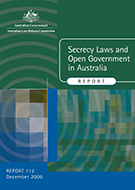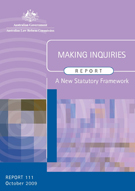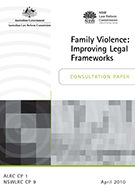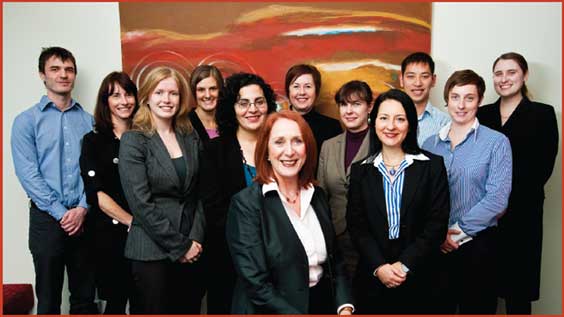12.10.2010
In conducting its inquiries the ALRC consults broadly with relevant stakeholders and experts interested in each area under review and researches and analyses the legal, social and administrative issues raised during the course of these consultations. As required by its Act, the ALRC also has regard to relevant international obligations; the potential impact of its recommendations on the costs of obtaining access to and dispensing justice; and personal rights and liberties, ensuring that citizens are not unduly dependent on administrative rather than judicial decisions. As part of the inquiry process, the ALRC produces a number of consultation papers that present issues and raise proposals for reform. It calls on the community to respond to the issues and proposals through both formal submissions as well as through more informal feedback mechanisms, such as online discussion forums, phone-ins, focus groups and roundtables, where appropriate. These external contributions, and the ALRC’s own research, inform the preparation of a final report with recommendations for the Government’s consideration. These final reports assist the Government to make informed decisions about reforming the law and related processes.
Table 2: Program 1.1 Deliverables
| 2009–10 Budget | 2009–10 Achieved | |
| Inquiries | 2 | 4 |
|---|---|---|
| Final reports | 2 | 2 |
| Consultation papers | 3 | 4 |
| Advisory Committees | 2 | 2 |
| Consultation meetings | 70 | 136 |
Inquiries
It is usual for the ALRC to work on two inquiries at the one time. In 2009–10, the ALRC worked on four inquiries as referred to it by the Attorney-General:
- the Review into Commonwealth Secrecy Laws;
- the Review into the Royal Commissions Act 1902 (Cth) and related issues;
- the Review into Family Violence Laws; and
- the Review into Discovery of Documents in Federal Courts.
Review into Commonwealth Secrecy Laws
 During this reporting period, the ALRC worked for six months on producing the final Report for the Secrecy Inquiry, which was presented to the Attorney-General in December. On 5 August 2008, the ALRC had received Terms of Reference from the Attorney-General to review relevant laws and practices relating to the protection of Commonwealth information, including the scope and appropriateness of legislative provisions regarding secrecy and confidentiality. (Terms of Reference in full are at Appendix C).
During this reporting period, the ALRC worked for six months on producing the final Report for the Secrecy Inquiry, which was presented to the Attorney-General in December. On 5 August 2008, the ALRC had received Terms of Reference from the Attorney-General to review relevant laws and practices relating to the protection of Commonwealth information, including the scope and appropriateness of legislative provisions regarding secrecy and confidentiality. (Terms of Reference in full are at Appendix C).
Federal legislation contains a large number of provisions that impose duties on public servants concerning information that comes to them by virtue of their office. The ALRC’s ‘mapping’ of federal statutes identified 506 secrecy provisions in 176 pieces of Commonwealth legislation, including 358 criminal offences. Many of these provisions create serious criminal offences for unauthorised disclosure of information. Some provisions prohibit the disclosure by a public servant of any kind of information, acquired in the course of his or her duties. Other provisions protect particular kinds of information including information relating to personal affairs, commercially sensitive information and information obtained by law enforcement and other investigatory agencies. Some federal provisions also prohibit the unauthorised collection, possession, recording, receipt and solicitation of Commonwealth information.
The ALRC was directed to consider options for ensuring a consistent approach across government to the protection of Commonwealth information, balanced against the need to maintain open and accountable government processes through providing appropriate access to information.
The ALRC released an Issues Paper, Review of Secrecy Laws (IP 34), in December 2008 that outlined the scope of the review, and sought stakeholder feedback on a number of questions. To facilitate communication about the nature and focus of this Inquiry, the ALRC also released an overview document, Review of Secrecy Laws—Inquiry Snapshot, in February 2009.
The ALRC held a ‘National Secrecy Phone-In’, on Wednesday 11 February and Thursday 12 February 2010, targeted primarily to Commonwealth public servants and set up an interactive online forum, ‘Talk to Us … about Secrecy’, to provide another means for engaging with the Inquiry process. The ALRC received 46 formal submissions addressing the Issues Paper.
On 18 June 2009, the ALRC released a more detailed Discussion Paper, Review of Secrecy Laws (DP 74), that contained 65 preliminary proposals for reform. The focus of the proposals was on providing a principled basis for a revised general secrecy offence—applicable to all current and former Commonwealth officers—complemented by criteria for reviewing the plethora of specific secrecy provisions and revised administrative procedures and practices aimed at fostering effective information handling in the public sector.
The secrecy team conducted 34 consultations in the course of the Inquiry, including in Brisbane, Canberra, Sydney and Melbourne. The ALRC received 38 submissions following the release of the Discussion Paper.
The ALRC was originally due to report to the Attorney-General on 31 October 2009. The ALRC was granted an extension to 11 December 2009 by the Attorney-General due to the volume and significance of late submissions received, as well as the need to refocus a number of the ALRC’s recommendations in light of material in those submissions.
The ALRC’s final Report, Secrecy Laws and Open Government in Australia (Report 112, 2009), was tabled in Parliament on 11 March 2010. The focus of the Report’s 61 recommendations is on a new and principled framework designed to reinforce open and accountable government while ensuring adequate protection for Commonwealth information that should legitimately be kept confidential. A key focus of the Report is to ‘wind back’ the use of criminal sanctions for the unauthorised disclosure of information, including the repeal of s 70 of the Crimes Act 1914 (Cth).
The ALRC recommended a principled basis for a revised general secrecy offence— applicable to all current and former Commonwealth officers—complemented by criteria for review of the plethora of specific secrecy provisions, as well as revised administrative laws and practices aimed at fostering effective information handling in the public sector. The principles underpinning the ALRC’s recommendations are that administrative and disciplinary frameworks should play the central role in ensuring that government information is handled appropriately and that in most cases, unauthorised disclosure of Commonwealth information can be dealt with through better education and training and by improved information-handling practices and, where necessary, public service disciplinary procedures, rather than by criminal sanctions. Criminal sanctions should only be imposed where the unauthorised release of information has caused, or is likely or intended to cause, harm to identified public interests.
The Report also recommends that every Australian Government agency should develop and publish information-handling policies and guidelines to clarify the application of secrecy laws and that there is a role for the Office of the Information Commissioner to provide independent oversight of the manner in which Australian Government agencies discharge their information-handling responsibilities.
The Commissioner in charge of the Secrecy Inquiry was Professor Rosalind Croucher. Three Advisory Committee meetings were held during the Inquiry. The ALRC thanks all members of the Advisory Committee for their careful and productive consideration of the issues raised through the Inquiry process and the frank advice they provided to the Inquiry team. (A full list of the Secrecy Advisory Committee members is at Appendix D).
Review into the Royal Commissions Act 1902 (Cth) and related issues
 During this reporting period, the ALRC worked for four months on producing the final Report for the Royal Commissions Inquiry which was presented to the Attorney- General in October. On 20 January 2009, the ALRC had received Terms of Reference from the Attorney-General to review the operation and provisions of the Royal Commissions Act 1902 (Cth) and related issues. (Terms of Reference in full are at Appendix C).
During this reporting period, the ALRC worked for four months on producing the final Report for the Royal Commissions Inquiry which was presented to the Attorney- General in October. On 20 January 2009, the ALRC had received Terms of Reference from the Attorney-General to review the operation and provisions of the Royal Commissions Act 1902 (Cth) and related issues. (Terms of Reference in full are at Appendix C).
Royal Commissions occupy a unique place in the Australian system of government, being the highest form of inquiry on matters of public importance. When there are controversial issues that cannot be handled satisfactorily by the courts or the political process, there are invariably calls for the establishment of a Royal Commission.
However, in recent years, some inquiries have experienced difficulties because provisions of the Royal Commissions Act are antiquated or inappropriate. These difficulties have included the power to compel the provision of information, a lack of power to investigate breaches of the Act, the adequacy of penalties for a failure to comply with the Act, and the ability of Royal Commissions to communicate information about unlawful behavior to law enforcement bodies. Royal Commissions are also often expensive, running into the tens of millions of dollars.
The ALRC was directed to consider whether there is any need to develop an alternative form or forms of Commonwealth executive inquiry, with statutory foundations, to provide more flexibility, less formality and greater cost-effectiveness than a Royal Commission (particularly whether there would be any advantage in codifying special arrangements and powers that should apply to such alternative forms of inquiry).
The ALRC’s final Report, Making Inquiries: A New Statutory Framework (Report 111, 2009), represents the culmination of the nine month inquiry. Two community consultation documents—an Issues Paper (IP 35, April 2009) and a Discussion Paper (DP 75, August 2009)—were produced before proceeding to the final Report. The final Report makes 82 recommendations for reform.
During the course of the Inquiry, the ALRC received 32 written submissions and conducted over 70 consultation meetings and roundtables, travelling to Perth, Adelaide, Melbourne, Sydney, Alice Springs, Darwin and Wellington (New Zealand). The ALRC consulted widely, including with solicitors for Inquiry participants, barristers, academics, senior public servants, witnesses who have appeared before a Royal Commission or other public inquiry, land councils and other groups representing the interests of Indigenous peoples, members of the media, union representatives, civil libertarians, and key office holders such as the Inspector-General of Intelligence and Security (IGIS) and the Commonwealth Ombudsman. The ALRC also spoke to individuals involved in major inquiries over the past 20 years—including the Commissioners in charge of the: Inquiry into the Case of Dr Mohamed Haneef (2008); Equine Influenza Inquiry (2008); Inquiry into Certain Australian Companies in Relation to the UN Oil-For-Food Program (2006); Inquiry into the Circumstances of the Immigration Detention of Cornelia Rau (2005); Inquiry into Australian Intelligence Agencies (2004); Royal Commission into the Building and Construction Industry (2003); HIH Royal Commission (2003); and Royal Commission into Aboriginal Deaths in Custody (1991).
The Report recommends the Royal Commissions Act 1902 (Cth) be renamed the Inquiries Act and amended to provide for the establishment of two tiers of public inquiry—Royal Commissions and Official Inquiries—each with defined coercive and investigatory powers. Other ALRC recommendations were directed at openness and accountability, including the publication of inquiry reports and monitoring the resulting activity. The ALRC also recommends that the new legislation include requirements for the prompt tabling of Royal Commission and Official Inquiry Reports in Parliament; publishing a summary of the cost of each Royal Commission and Official Inquiry; and a framework for the protection of protected national security information utilised in the proceedings of Royal Commissions or Official Inquiries.
The Commissioner in charge of the Inquiry was Professor Les McCrimmon. The Report was tabled in Parliament on 4 February 2010.
Review into Family Violence Laws
 On 24 July 2009, the ALRC received Terms of Reference for an inquiry to reform legal frameworks to improve safety for women and children in cases of family violence. (Terms of Reference in full are at Appendix C). The ALRC was asked to consider both the interaction in practice of state and territory family/domestic violence and child protection laws with the Family Law Act and relevant Commonwealth, state and territory criminal laws; and the impact of inconsistent interpretation or application of laws in cases of sexual assault occurring in a family/domestic violence context, including rules of evidence, on victims of such violence. In relation to both issues the Attorney-General requested that the Commission consider what, if any, improvements could be made to relevant legal frameworks to protect the safety of women and their children. The ALRC was directed to work jointly with the New South Wales Law Reform Commission (NSWLRC) with a view to developing agreed recommendations. ALRC President, Professor Rosalind Croucher heads up the Family Violence Inquiry and on 14 December, the Attorney-General appointed Victorian Magistrate Anne Goldsbrough to the ALRC as a part-time Commissioner for the Family Violence Inquiry. In March, the NSWLRC announced the appointment of a new Commissioner, Emeritus Professor Hilary Astor, to the NSWLRC who also heads up the joint Family Violence Inquiry.
On 24 July 2009, the ALRC received Terms of Reference for an inquiry to reform legal frameworks to improve safety for women and children in cases of family violence. (Terms of Reference in full are at Appendix C). The ALRC was asked to consider both the interaction in practice of state and territory family/domestic violence and child protection laws with the Family Law Act and relevant Commonwealth, state and territory criminal laws; and the impact of inconsistent interpretation or application of laws in cases of sexual assault occurring in a family/domestic violence context, including rules of evidence, on victims of such violence. In relation to both issues the Attorney-General requested that the Commission consider what, if any, improvements could be made to relevant legal frameworks to protect the safety of women and their children. The ALRC was directed to work jointly with the New South Wales Law Reform Commission (NSWLRC) with a view to developing agreed recommendations. ALRC President, Professor Rosalind Croucher heads up the Family Violence Inquiry and on 14 December, the Attorney-General appointed Victorian Magistrate Anne Goldsbrough to the ALRC as a part-time Commissioner for the Family Violence Inquiry. In March, the NSWLRC announced the appointment of a new Commissioner, Emeritus Professor Hilary Astor, to the NSWLRC who also heads up the joint Family Violence Inquiry.
While the Terms of Reference were received in July, the ALRC was not able to commit a legal team to the Inquiry until after the completion of both the Royal Commissions and Secrecy Inquiries in October and December 2010, respectively. The NSWLRC was not able to commit its resources until that time also, given its other work commitments. With a reporting date initially of 31 July 2010—which, in effect, meant a seven month timeframe for the whole Inquiry—the ALRC and the NSWLRC (the Commissions) had to think strategically about how to proceed. It was decided to hold a substantial number of consultations to inform the Commissions’ thinking early in the inquiry process and to produce one consultation document and to have one formal call for submissions, as opposed to the ALRC’s established two stage consultation strategy and submission process.
An Inquiry roundtable was held in October with representatives from the Family Court system, Magistrates Courts, the Institute of Criminology and from relevant fields of academia to assist the Commissions to identify key issues that could be explored in the consultation process. Sixty individuals and organisations from around Australia, working in the areas of family violence, sexual assault and child protection, were consulted by the Commissions to inform the thinking behind the development of the Consultation Paper. In addition, the ALRC invited Mr George Zdenkowski, former ALRC Commissioner, academic and magistrate to assist the Inquiry team as a special adviser. The ALRC also called on the expertise of other experts at key points in the Inquiry process, including Dr Jane Wangmann and Dr Annie Cossins in the areas of sexual assault and child sexual assault; Mr Stephen Odgers SC, in relation to sexual assault evidence issues; Professor Patrick Parkinson, in relation to Family Law Act intersections with child protection, and Hannah McGlade in relation to our Indigenous Consultation Strategy.
Two new strategies of seeking stakeholder engagement were developed for this Inquiry—an e-newsletter and an online forum. The monthly Family Violence Inquiry e-newsletters provided a way to keep stakeholders informed about the Inquiry’s progress on a regular basis. Each e-newsletter also highlighted an ‘issue in focus’ and sought views, experiences or recommendations in relation to the particular topic. Links were provided to give immediate feedback on the issue in focus through the online comment form, as well as providing information about how to make formal submissions. The online forum was conducted from November 2009 to January 2010 amongst women’s legal services, assisted by a grant from the Government 2.0 Taskforce. This provided a targeted consultation with key stakeholders from around the country who were asked to focus on specific areas under consideration each week. Both these online strategies provided extremely useful feedback for the Commissions in the preparation of the Consultation Paper. More information about these online strategies is included in the ‘ALRC Website and Gov 2.0’ article in the special features section.
On 29 April 2010, notwithstanding the challenging timeframe and the very wide scope of the Terms of Reference, the Commissions released two documents—a Consultation Paper, Family Violence—Improving Legal Frameworks (CP 1); and a Consultation Paper Summary, Family Violence—Improving Legal Frameworks (CPS 1). These Consultation Papers were effectively written in three months, an incredible achievement given that the Commissions had to look at the interrelationship in practice of at least nine sets of criminal laws, eight sets of child protection laws, eight sets of family violence laws and the Family Law Act, as well as evidence laws, sentencing laws and a range of other legal processes. The Commission’s legal officers must be congratulated on producing such a significant document of high quality in the timeframe available—in particular, ALRC Senior Legal Officer Isabella Cosenza, who played a leading role from the outset of the Inquiry and ALRC Senior Legal Officer Ms Carolyn Adams who produced the Consultation Paper Summary.
The decision to produce two complementary documents was a response to the timeframe and also a recognition of the different audiences to which the inquiry process speaks. While many of our engaged stakeholders were able to quickly access the proposals and questions in the Consultation Paper Summary, the much larger Consultation Paper provided the full scope of background research and thinking underlying the questions and proposals for those wanting to consider the information more fully.
Following the release of the consultation documents the Commissions embarked on a further intensive round of consultations and presentations: in Perth, Mackay, Darwin, Alice Springs, Hobart, Melbourne, Sydney and regional New South Wales. One hundred and ten consultations were undertaken during the Inquiry.
The ALRC also developed a strategy for consultation with Indigenous stakeholders with assistance from the ALRC’s Indigenous Advisory Committee and other Indigenous stakeholders. On 19–20 May, Professor Rosalind Croucher attended the National Indigenous Family Violence Prevention Forum 2010 in Mackay, Queensland and led a yarning circle on the topic of the Family Violence Inquiry: ‘Have your say—improving legal frameworks for Aboriginal and Torres Strait Islanders’. The yarning circle provided an excellent opportunity to consult with Aboriginal and Torres Strait Islander stakeholders from around Australia on the issue of family violence. The Consultation Paper Summary was available at the yarning circle and participants were encouraged to make written submissions. The ALRC produced a brochure targeted at Indigenous stakeholders and communities encouraging their participation in the Inquiry and a number of consultations were also held with Indigenous organisations and individuals around the country. More information about our Indigenous Consultation Strategies is included in the article ‘Reconciliation Action Plan Update’ in the special features section.
Submissions relating to the questions and proposals in the Consultation Paper were due on 4 June. However, following requests from many key stakeholders for an extension to the submission deadline, including from Commonwealth, State and Territory departments and agencies, as well as the great public interest in the recommendations that will emerge from the Inquiry and the need for the Commissions to give full consideration to the very high number of submissions received, a small extension to our reporting timeline was sought and agreed to by the Attorney-General with submissions due to the ALRC by 25 June 2010. A total of 240 submissions have
now been received in response to the Consultation Paper, with 41 submissions being received after the original due date and a further 35 submissions being received after the final due date, with the latest submission being received on 9 August 2010. The Attorney-General also granted a request for an extension to the reporting timeframe for the Inquiry. The final Report is now due to the Attorney on 11 October 2010.

The ALRC Family Violence Inquiry Team, from left to right: Mr Jared Boorer, Ms Tina O’Brien, Ms Katherine McGree, Ms Anna Dziedzic, Ms Maha Melhem, Professor Rosalind Croucher, Ms Carolyn Adams, Ms Sara Peel, Ms Isabella Cosenza, Mr Khanh Hoang, Ms Amanda Alford and Ms Christina Raymond.
Review of Discovery of Documents in Federal Courts
On 11 May 2010, the Attorney-General, the Hon Robert McClelland MP, referred to the ALRC an Inquiry to explore options to improve the practical operation and effectiveness of discovery of documents in litigation before federal courts. (Terms of Reference in full are at Appendix C). The ALRC will report to the Attorney-General on 31 March 2011. The ALRC has been advised that a part-time Commissioner for the Discovery Inquiry will be appointed in due course. Work on the Inquiry has begun, with preliminary discussions to inform both the constitution of an Advisory Committee and key issues for development of a consultation paper to be released later in the year.
